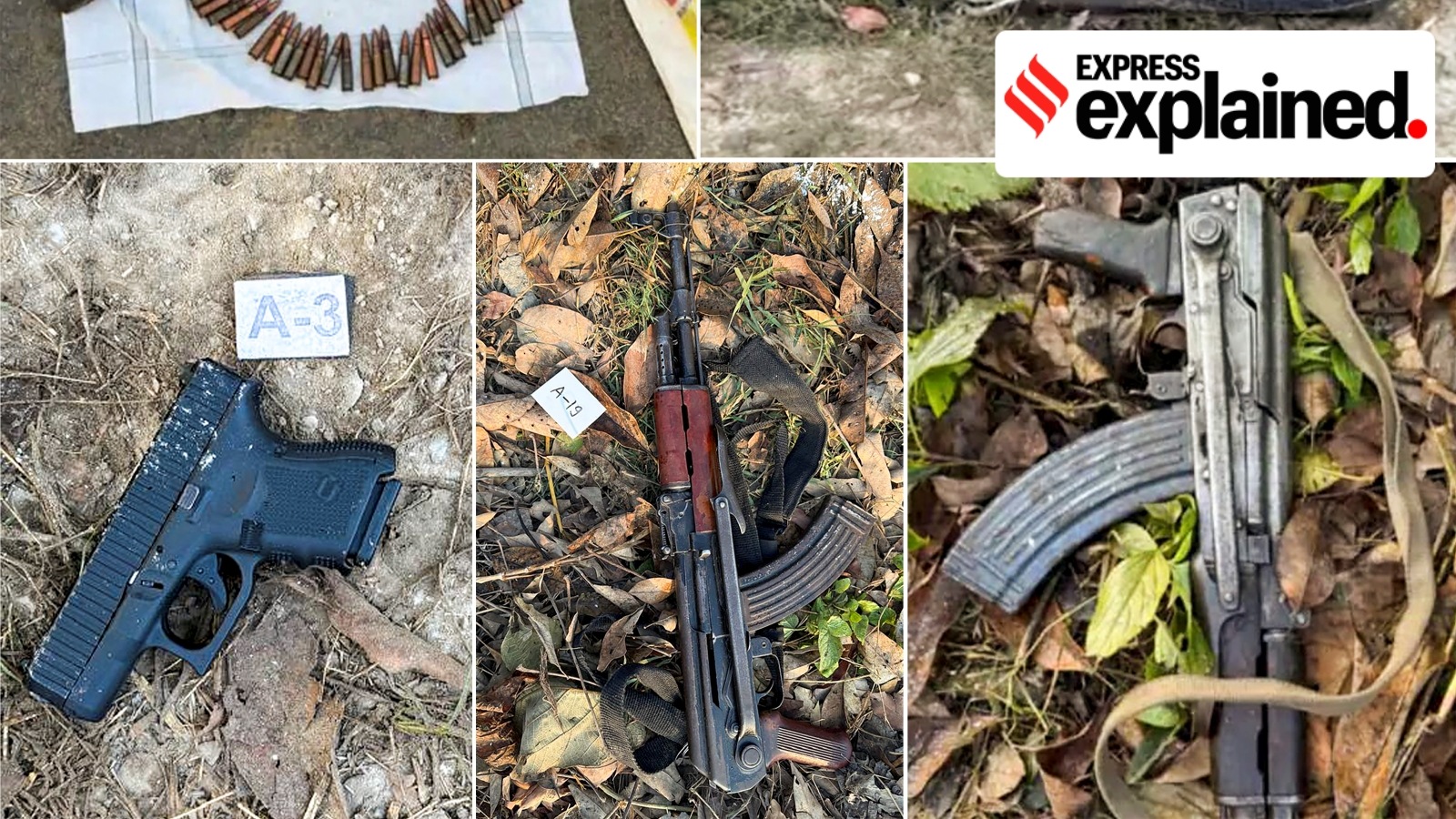With recent militant activity in Punjab, a look at key accused and their link to pro-Khalistan groups
Many violent incidents in Punjab between January and October were attributed to gangsters but their nexus with militant groups is now out in the open.
 Arms recovered at the site of an encounter of three terror suspects, allegedly involved in the grenade attack in Gurdaspur in Pilibhit, Uttar Pradesh on Monday. (PTI Photo)
Arms recovered at the site of an encounter of three terror suspects, allegedly involved in the grenade attack in Gurdaspur in Pilibhit, Uttar Pradesh on Monday. (PTI Photo) Punjab has seen a spurt of militant activity within the last month, with as many as eight grenade/Improvised Explosive Device (IED) attacks on police posts and police stations.
While there have been sporadic incidents of violence throughout 2024, the police say these attacks appeared to have been engineered to happen within a short period, to threaten police personnel and send them a message. The attacks also show a link between gangs and pro-Khalistan militants. Here is what to know.
What police establishments in Punjab have been targeted of late?
The first attack took place on November 23 at the Ajnala police station in Amritsar, when an IED failed to explode. This was followed by a grenade attack on November 29 on a police post in Gurbaksh Nagar, also in the Amritsar district.
The Aasron police post in Nawanshahar district was targeted with a grenade attack that failed on December 2. Two days later, an explosion happened in the Majitha Police Station in Amritsar district, accompanied by a loud sound. While the police claimed it was a “tyre burst”, senior SAD leader Bikram Majithia claimed it was a grenade attack.
A grenade attack was also attempted at the Ghania Ke Bangar police station in Batala, Gurdaspur district, on December 14. On December 17, a grenade attack took place in the Islamabad police station in Amritsar city.
Another such attack occurred on December 18 at the Bakshiwala police post in Gurdaspur district, and on December 20, a blast occurred at the Wadala Bangar police post of the Kalanaur Police Station in Gurdaspur district.
Did other incidents of violence precede these attacks?
There were violent incidents in Punjab between January and October. Many were attributed to gangsters and gang wars but their nexus with militant groups is now out in the open. Here are some major cases:
- On January 14, one Awan Kumar Khullar alias Sonu Cheema, Sarpanch of Chabal village in Tarn Taran district, was shot dead in broad daylight by two unidentified assailants. A Germany-based gangster named Amritpal Singh Bath allegedly orchestrated the killing.
- On April 4, former militant Rattandeep Singh, who had been part of the Bhindranwale Tiger Force of Khalistan (BTKF), was shot dead in the Balachaur town of Nawanshahar district. He was released from prison in 2019. US-based gangster Gopi Nawanshahria claimed responsibility, saying Rattandeep was a police tout.
- One Sandeep Singh was murdered on April 8 in Dera Baba Nanak in Gurdaspur district. Another US-based gangster named Harpreet Singh alias Happy Passia claimed responsibility, alleging Sandeel was a police informant and source for the National Investigation Agency (NIA).
- Operatives of a terror module backed by a Pakistani group killed Vikas Prabhakar, president of the Vishwa Hindu Parishad (VHP), on April 13 in Nangal town of Ropar district.
- Gurpreet Singh was shot dead by four people in a village in Faridkot district on October 9. A month later, two people were arrested for his murder and the police claimed that they were members of Arshdeep Singh alias Arsh Dalla gang. Based in Canada, Dalla is alleged to head the Khalistan Tiger Force (KTF).
Who was held responsible?
Police investigations, as well as claims made by various terror organisations associated with pro-Khalistan elements, have pointed to the Khalistan Zindabad Force (KZF), Khalistan Tiger Force (BTF) and Babbar Khalsa International (BKI).
The police say the Ajnala police station attack was engineered by BKI’s Harwinder Singh Rinda and orchestrated by Pakistan’s Inter-Services Intelligence (ISI). Senior police officials have also indicated the roles of Happy Passia and Germany-based Jeevan Fauji.
KZF was found to be responsible for the Aasron attack, with local modules being directed by its handlers based in Germany, the UK and other countries.
What has the police found on the nexus between gangsters and pro-Khalistan militants?
Investigations into the gangster-terror network associated with Babbar Khalsa International and the Lawrence Bishnoi gang have resulted in many revelations. In November 2023 the NIA filed a chargesheet, with crucial details of their involvement in the terror-related activities.
Darmanjot Singh alias Darman Kahlon, Parveen Wadhwa alias Prince, Yudhvir Singh alias Sadhu and Vikas Singh were charged with criminal conspiracy to unleash a wave of terror.
Kahlon is one of the key links between Canada-based absconder Lakhbir Singh alias Landa, an operative of the BKI-Bishnoi terror and crime syndicate. Operating from the US, he has been actively involved in criminal activities like the smuggling of weapons, explosives, and drugs/heroin originating in Pakistan for use in India.
Parveen Wadhwa is an associate of the Bishnoi terror syndicate. He was a linchpin in disseminating vital information. Investigations indicate that he was instrumental in coordinating communication channels, enabling seamless interactions among gang members – even those incarcerated in different jails.
Yudhvir Singh was the terror syndicate’s chief arms procurer. His role and expertise extend to facilitating the procurement of arms and ammunition from foreign countries.
Vikas Singh is another associate of the Bishnoi gang, known to be involved in providing sanctuary to gang members and working to execute terror attacks and criminal operations across multiple states. Notably, he provided a safe harbour to the gang members responsible for the RPG terror attack at the Punjab Police State Intelligence Headquarters in Mohali in May 2022.
Who are the key individuals involved in the attacks?
Harwinder Singh Sandhu alias Rinda and Lakhbir Singh Sandhu of BKI, and Arshdeep Singh of KTF are all based abroad, where they have created networks of operatives to carry out terror activities in India. They have close contacts with drug smugglers/pro-Khalistan operatives in Pakistan and other countries.
Rinda is involved in offences like smuggling of arms, ammunition explosives and drugs into Indian territory from Pakistan, recruitment of operatives, murders, raising funds for BKI through extortion, etc. Part of several terror incidents, including the RPG attack, he was declared as an “individual terrorist” in 2023 by Government of India.
A former gangster, Sandhu reportedly fled to Pakistan illegally in 2018 or 2019 and is currently believed to be living there under the patronage of ISI.
Arshdeep Singh, hailing from Moga in Punjab, was a gangster who left for Canada where he came in contact with Hardeep Singh Nijjar, the chief of the terrorist organisation KTF. Nijjar was killed in 2023 and Canada alleged the Indian government’s role, which Indian authorities denied.
The duo engaged in the recruitment of youth and the formation of terrorist gangs for carrying out extortion and raising funds for KTF. They also carried out target killings of businessmen and leaders from particular communities in Punjab. The Indian government declared Dalla an “individual terrorist” in 2023.
Lakhbir Singh Sandhu alias Landa, originally from Tarn Taran, Punjab, was initially involved in gang-related activities. In 2017, he left for Canada. He also came in contact with BKI’s Rinda and started working for him. He has been the main accused in several terrorist incidents, including the 2022 RPG attacks in Mohali and Tarn Taran. He was also the mastermind of the conspiracy to kill Punjab Police SI Dilbagh Singh in 2022.
Other foreign-based BKI nodes are Harjot Singh in the USA, Kashmir Singh Galwaddi, suspected to be in Nepal, and Tarsem Singh, brother of Lakhbir Singh Sandhu alias Landa, in Dubai. KTF’s Gurjant Singh, in Australia, is also reportedly involved.
- 01
- 02
- 03
- 04
- 05






































